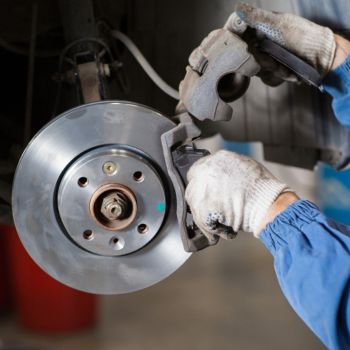 Brakes are designed to stop a vehicle that typically weighs around 4,000 pounds. However, the friction generated during braking can lead to overheating, which may damage other parts of your car. Understanding how this happens and what you can do to prevent it is essential for safe driving.
Brakes are designed to stop a vehicle that typically weighs around 4,000 pounds. However, the friction generated during braking can lead to overheating, which may damage other parts of your car. Understanding how this happens and what you can do to prevent it is essential for safe driving.
How Your Brakes Work
Most modern cars use disc brakes. These consist of a solid or ventilated disc (also called a rotor) located near each wheel, held in place by brake pads. When you press the brake pedal, hydraulic pressure from the brake fluid causes the pistons to push the pads against the rotor, creating the friction needed to slow or stop the car. This system is efficient, but it also generates a lot of heat.
The heat from the friction is absorbed by the rotors and pads, while the brake fluid helps manage some of the temperature. Ventilated or slotted rotors are designed to help dissipate heat more effectively, keeping the system cooler under normal conditions.
Common Causes of Brake Overheating
Overheating brakes can be caused by several factors, including:
- Worn or damaged brake pads: As they wear down, they can cause excessive friction and heat, leading to further damage.
- Misaligned components: If the brake pads don’t sit correctly, uneven pressure can cause premature wear and overheating.
- Improper bedding-in of new pads: New pads need to be broken in properly with the rotors to function efficiently and avoid overheating.
- Inadequate cooling: If the brakes stay hot for too long, the fluid can boil, reducing effectiveness and causing a spongy brake feel.
- Water contamination in brake fluid: Over time, brake fluid can absorb moisture, lowering its boiling point and increasing the risk of overheating.
- Glazed or melted pads: Excessive heat can cause the bonding material in the pads to melt, reducing friction and making the brakes less effective.
Signs That Your Brakes Are Overheating
If your brakes are overheating, you might notice one or more of these symptoms:
- The brake warning light comes on.
- You hear a squeaking or creaking noise when braking—this could indicate glazed pads or worn linings.
- Your brake pedal feels soft or spongy, a sign of fluid degradation or air in the system.
- You smell burning or smoke when applying the brakes, which could mean parts are sticking or wearing out.
What to Do if Your Brakes Overheat
If you suspect your brakes are overheating, it’s important to act quickly. Here’s what you should do:
- Stop driving as soon as it's safe to do so. Continuing to drive can increase the risk of brake failure or even a fire.
- Pull over to a safe location, away from traffic.
- Try to roll the car to a stop if possible, without using the brakes excessively.
- Once stopped, apply the parking brake to separate the brake pads from the rotor, helping them cool down.
- If the brakes are still hot, avoid driving until they have cooled completely. Schedule a service appointment right away for a full inspection.
- If the car doesn't seem safe to drive, consider having it towed to a repair shop.
Preventing Future Brake Overheating
To keep your brakes in good condition and avoid overheating:
- Use gentle, gradual pressure when braking instead of slamming on the brakes.
- Avoid holding the brake pedal down while going downhill. Use engine braking instead by shifting to a lower gear.
- Regularly check and replace brake fluid as recommended by your vehicle’s manufacturer.
- Have your brake system inspected periodically, especially if you drive in hilly areas or frequently make sudden stops.
Don’t ignore signs that your brakes might be overheating. A small issue can quickly turn into a major safety hazard. If you're concerned about your car's brake system, schedule an inspection at DaSilva’s Auto Body. Our team of professionals can check your brakes, replace any worn parts, and ensure your vehicle is safe to drive. Contact us today to learn more and book an appointment.
Capsule Filling Machine,Powder Capsule Filling Machine,Ready Stock Automatic Capsule Filler,Fully Automatic Capsule Filling Machine
Jiangyin Longchang Machinery Manufacturing Co,Ltd , https://www1.jylongchanggrinderline.com